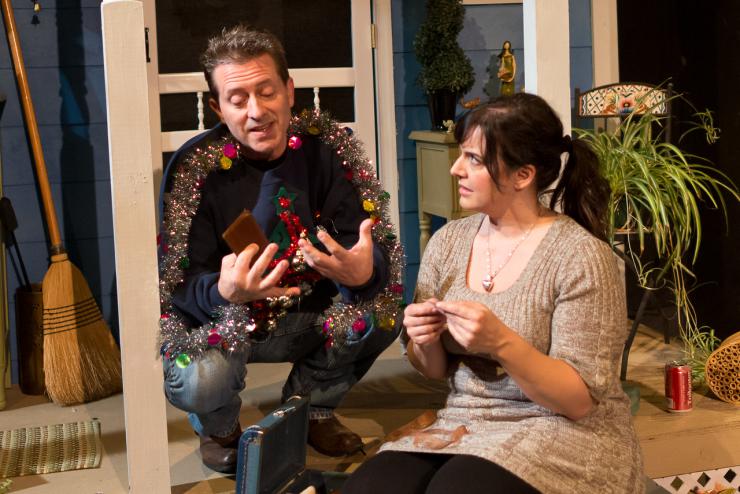Silence is Golden
The Electric Properties of Subtext in Playwriting
Silence in storytelling is good and it is necessary. In virtually every playwriting class in America, there is a chapter on subtext. Yet, there still exists a pervasive lie in theatre that noise is the only way to tell a story. How can writers focus less on filling the page with words and more on creating the electric moments where characters assert themselves in the void? This blog series focuses on how to strip text down to its essence and return the gift of tension.

“Yeah, that part with all the words... that was my favorite part!” —No theatre patron, ever
Most of us walk around spiritually starved and emotionally depleted. It's no wonder we hold on to songs of love and heartache. They allow us to feel something. This is why silence in storytelling is so necessary. It compels us to contribute our own reality to the story, to fall in love, and to take the story home.
I hate the word pace. It's an excuse to trample on the whole at the expense of the delicate. There's a lot of malpractice in the theatre these days: the idea that if there's “nothing” happening, then there’s nothing happening. OK then, let’s talk about nothing.
In virtually every playwriting class in America, you will find a chapter on subtext. Yet, there still exists a pervasive lie in theatre that noise is the only way to tell a story, that dialogue is the only dialogue, and that despite overwhelming evidence to the contrary, if a character isn't speaking the audience will fall asleep. Directors often compound the issue further by defragmenting the script for consumption by so-called "short-attention span audiences."
If you want electricity in your play, you have to be ruthless with dialogue. And you must begin—and end—with the audience in mind.
The biggest problem I see with this toxic combination is that our narratives have become compressed beyond all recognition. When this happens, the first thing that gets cut is the very heart of the play. If a surgeon was to go into the operating room to perform a routine appendectomy and accidently removed a kidney instead, there’s little question he would be considered guilty of malpractice. At the end of a bad evening of theatre, we may not always recognize when something has gone terribly wrong, but we are often left severely malnourished and wondering why on earth we bothered in the first place. Ignoring the silence and subtext—the beats—is like telling only half the story...and not the best half.
“Most writers don’t know that actors are never better than in the pauses or in the subtext. They give actors too many words. In a play, words are parentheses to the silences. They’re useful for the actors, but . . . they aren’t the whole story.” —Yasmina Reza
How did the audience member become an afterthought? One cannot simply wish a play into containing atmosphere and resonance and vibration and tension. These qualities do not magically appear out of thin air; they are not delivered by drones to the rehearsal room. They are, instead, a profoundly useful byproduct of a language astutely constructed for the sole purpose of exploiting the void. In other words, if you want electricity in your play, you have to be ruthless with dialogue. And you must begin—and end—with the audience in mind.
I happen to be of the opinion that there are too many words on the page and stage. A theatre audience will habituate to the noise of extraneous dialogue, similar to factory workers adjusting to a constant hum; healthcare workers tuning out the sound of alarms and bells; or a parent who has no idea their “precious” children are annoying the hell out of other people. It’s not a comforting thought that all of the gorgeous dialogue so carefully laid to the page is little more than noise to the listener—there is only so much the nervous system can take.
Think back for a moment. Remember a moment in your life that was spare, perfect… beautiful. Now imagine if that moment was suddenly trampled by dialogue. There is a reason we quote poets and philosophers. It is because they have a way of distilling very big ideas into tiny little packages.
When you strip away the noise, magical things begin to happen. First, the actor is given the freedom of choice: he is no longer saddled with the liability of an exacting sentence. Secondly, the sentences begin to echo and resonate. In this example, notice how the removal of only a few words creates tension and texture, opening the actor up to countless opportunities for interpretation:
Before:
LIZZY
You gon’ see her again?
JACK
No.
LIZZY
She made a bad first impression.
JACK
No, no, no. Look, I can tell if a woman is nervous and when a woman is just talking. She was talking, she likes to talk.
LIZZY
Well maybe if you were so quiet, that’s why she was so chatty.
JACK
No, it’s not even that. But there’s gotta be some spark, ok? And it’s gotta be in all the right places. And if all you do is fill the air with words, and more words, there ain’t nothing left.
After:
LIZZY
You gon' see her again?
JACK
No.
LIZZY
Why not?
JACK
I told you, she talks too much.
LIZZY
Maybe she was nervous.
JACK
I was nervous. I was quiet.
LIZZY
Well, maybe if you were so quiet, that's why she was so nervous, ever think o' that?
JACK
I was listening.
LIZZY
Well, don't be so selfish.
We need look no further than the masters for examples of transcendent storytelling through silence and subtext. I recently asked playwrights to share some of their favorites and was I reminded of these marvelous examples:
“When Bessie spills her pills near the end of Marvin’s Room by Scott McPherson, this little everyday problem is overwhelming after what she has dealt with.” —Greg Waters
“The pause just after Lucky's speech in Samuel Beckett’s Waiting for Godot is when Estragon waits before saying, ‘I think he's tired!’ It’s absolutely stunning.” —Don Webb
“In Annie Baker's Circle Mirror Transformation, there’s a pause between moments nine and ten. Also, ‘I don't want my parents to die. (He considers this). That's it.'” —Corbin Went
If you go into production and your script feels static and lifeless, chances are it has nothing to do with the acting. By all means, fill the page with words, but the real work begins in the removal process—and there is a removal process. The good news is you don’t have to be a genius to create magic.
Sample dialogue taken from Maytag Virgin by Audrey Cefaly.












Comments
The article is just the start of the conversation—we want to know what you think about this subject, too! HowlRound is a space for knowledge-sharing, and we welcome spirited, thoughtful, and on-topic dialogue. Find our full comments policy here
I very much like this article. I worked with a dramaturg once who's favorite saying was, "I never met a play I couldn't cut ten percent out of." I hold on to that piece of advice, and every time I think a script is ready to go out into the world, I go back through it to cut 10%. It's very hard, I have to be ruthless with myself, but I think it's valuable.
Up until that point when playwrights either began imitating the faux-realism of film and television -- "all the words" was indeed one of those things that caused audience members to flock to certain playwrights. Playwriting's origins are in fact in the public performance of poetry; dramatists were poets -- and some still are.
I see a lot of theater, and in the end, whether or not "all the words" are memorable or mesmerizing has a lot to do with whether or not the play makes an impact that I remember years later.
Certainly, there's a nuanced argument to be made in the name of subtext -- but such a flippant opener that heaps scorn on drama's roots in poetry is not how one makes this argument.
i agree! well said
Interesting article. My additional two cents: I can't help wondering
(based on my own observations) if playwrights start out writing
with regard to subtext, but then get the notion "beat into" them that
they need to spell things out more literally because the
critiques they get are by who have only read their script, not seen a
production (or even staged reading).
For too many critiquers seem to forget that a play is meant to be performed, not read, and think (to save time) that they can "get out the red pen" and start heavily criticizing on a first pass. Whereas whenever I've been asked to read something I read the whole play first, as if I was watching a performance. Only then, now that I know (at least somewhat) the characters, do I read the play a second time looking for things that don't ring true.
I understand teaching playwriting doesn't pay much (if at all), but both in terms of subtext and in many other ways I think playwrights would be turning out better work if those that had critiqued them in their formative stages would have read (and mentally paused for subtext on occasion) first, and critiqued second, rather than believing they could do both at the same time.
From my perspective, as playwright, actor, and director, the topic of this article is relevant, however, I felt it rather opinionated and short-sighted. So I will venture a few of my own opinions based upon its content.
"It’s not a comforting thought that all of the gorgeous dialogue so carefully laid to the page is little more than noise to the listener." I believe I get the intent here, and I have had the experience of dialogue being noise. But a general statement like this is rather insulting to playwrights.
"There is a reason we quote poets and philosophers. It is because they have a way of distilling very big ideas into tiny little packages." I don't know what philosophers you've been reading, but some of them can be VERY long winded. And then there's Shakespeare. I also think 'Long Day's Journey Into Night' is one of the great plays. Certainly long on dialogue. The list of course could go on and on.
"When you strip away the noise, magical things begin to happen." Magical moments in the theatre can happen in many different ways. Some during dialogue, some during silence. And by the way, subtext is not only living on stage during the silences, it should also be living on a parallel track with the spoken word.
"First, the actor is given the freedom of choice: he is no longer saddled with the liability of an exacting sentence." Well, if a playwright knows their craft, including the importance of subtext, and cares enough about the material to not only edit, but also make each sentence count - which is my interpretation of an "exacting sentence," then the actor's job is to find a way through their craft to bring living truth to it. There have been a significant amount of times, as a director or actor [not just playwright] when I've heard another actor/actress complain about the difficulty of a particular line, often when they've only gone through the scene once or twice. I think it's safe to assume that the playwright knows more about the character than the actor who has just been with the story and character for a few weeks. Why? Because, the playwright has lived with the story and characters longer. Much longer. That does not mean an actor does not bring something vital, mysterious, imaginative, and valuable to the table. Of course they do. Everyone has a part to play. Hopefully they play it well.
In the dialogue sample provided, I really don't think the 2nd version added much tension and texture.
The reverse can also be true. If one's interpretation of subtext is the moments of silence on stage where some electrifying current of mystery, revelation, or vitality can be shared with the audience, then please make sure it is rocking the audience with theatrical impact. I've also seen productions where there was so much subtext going on, with silences that were so long, the actors reveling in their internal reality to such a degree, that my mind was either falling asleep or traveling to a distant galaxy.
Like any memorable piece of music it is the relationship between the notes and silence between the notes. Hopefully, between the playwright, director, and actors, the balance of that can be fleshed out, discovered, enhanced, clarified, to provide entertainment, relevance, and impact. Oh, and sometimes that requires a good sense of pacing. It's not a dirty word.
Respectfully,
M. J. Edan
It's not about the number of words. It's whether it is in balance with what's underneath. When language reveals action, it lives. Sometimes that's words, or sounds, or silence. Those recognizable or resonant bits of action, those are the building blocks of our art form. When the language tries to operate as prose or poetry, it dies as drama.
I do cut the words. Lots of them. But that's no guarantee a director is going to put pauses there. Yet, I've gotten pushback for writing the pauses into my scripts.
Then by all means, find another director. One who respects your work.
Interesting article. "I happen to be of the opinion that there are too many words on the page and stage" reminds me of Emperor Joseph's speech in "Amadeus"- "There are only so many notes the human ear can hear in a night". Depends on the play. Depends on the intent. Density of speech can reflect a character. Beckett wrote extremely powerful talk pieces like "Not I" and silent ones like "Embers". I agree that dialogue can often be trimmed, especially in the case of exposition, but trimming speech to fit theory can be just so much self-indulgence.